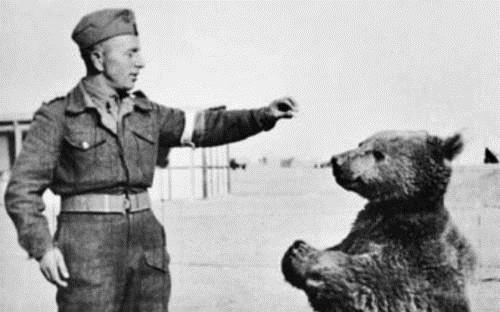In the minds of the philosophers of the 17th century, they held the idea of "animism", and they firmly believed that everything in the world has its own spirit. But with the development of science, we have been able to discern that this idea is wrong, but for animals, each of them has its own spirituality.
During the Second World War, there is a very magical story, a brown bear shows people fully their spirituality and intelligence. As the only battle bear in World War II, it carried shells on the front line and ran, and even had a salary card and rank, which was amazing.

In 1939, the Second World War broke out, and a total of 61 countries around the world were involved in this war, and the war was extremely tragic. On September 1 of that year, Germany launched a blitzkrieg against Poland, and the former Soviet Union also sent troops to attack at the same time, and on October 6, Poland was fully occupied in just one month. In order to protect the people, the Polish government-in-exile is still fighting for the sake of the people.
In 1942, Polish troops were stationed near Hamadan, Iran. A young boy from a local village found a toddler brown bear in the wild, and in exchange for a little food, the boy took the bear to a nearby Polish military camp and successfully made a deal with a few canned meats.
The soldiers of the army liked this little bear very much, which added a little color to their boring and dangerous military life. So the soldiers began to feed it with canned meat, but they were too young to eat. Just then, a soldier was in a hurry, putting the freshly cooked condensed milk in an empty bottle of vodka and putting it in meat so that the bear could eat.
In the life of the army, Little Bear and the soldiers of this artillery replenishment company developed a very good relationship. They would go to the shower together on time, gulp down canned meat, and occasionally take a sip of vodka, but the bears preferred the taste of beer. Even the soldiers' cigarettes were eaten with care.
On April 14, 1944, the garrison was about to sail to Naples, but the problem arose: only regular soldiers could board the ship, so that soldiers could not take bears on board. The soldiers, who were reluctant to bear, applied for a military card for it, and surprisingly the Commander of Cairo actually approved it.
As a result, the bear has a name called "Wojtek" Fojtek, which means smiling warrior in Polish, fully expressing the warriors' love for it. Foytek grew very quickly, soon turning into a hill, and the soldiers saw his strength and slowly taught him how to carry mortar shells.
Soon, the army was thrown into the Battle of Cassino, which broke out in 1941, to replace the British 78th Infantry Division, which suffered heavy losses. Foytek set foot on the battlefield for the first time, carrying supplies and shells with his comrades. Surprisingly, as a juvenile bear, Foytek was never frightened by the explosion of guns, and it carried supplies very calmly, as if it were walking on a weekday, and not a single mistake occurred.
The commander was extremely pleased with this, and immediately ordered the 22nd Artillery Transport Company to be renamed the 22nd Transport Company, with the badge as a bear holding a mortar shell. According to the recollection of a British soldier who fought in the war at the time, 1944 was a year he will never forget, and the brown bear that calmly walked past him and still held a cannonball frightened his soul.
On November 15, 1947, with the end of World War II, the army was disbanded. As one comrade after another returned home, Foytek was sent to Edinburgh Zoo for the rest of his life. In the zoo' life, it has always maintained the habits of the army, taking punctual bathes, drinking beer, and even asking his old comrades who come to visit him for a cigarette.
In 1963, Foytek died at the age of 22. As a member of the brown bear, it can be said to be very long-lived. His life was not just a military legend, it was a legend in the hearts of both Poles and The British. In 1958, the BBC's longevity animal program "Blue Pitt" was permanently hosted by Foytek. Both the Imperial War Museum in Edinburgh and London erected a statue to commemorate it, as did the War Museum in Ottawa, Canada.
Foytec can be said to show the world the high level of its intelligence, it is not only integrated with humans, and even wrote a stroke in the history of mankind, which can be described as the "great man" among brown bears.